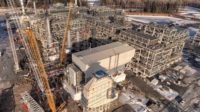Australia's super-heated marketplace and restrictions on importation of labor poses a particular challenge for gigaprojects. SKM has broadened its use of “virtual teaming” by using global forces more efficiently through high-definition video conference, teleconferencing and interactive file-sharing, says Rizzuto. “In cases where there are tight time frames and critical deadlines, virtual teams have worked around the clock across different time zones, speeding up the project delivery,” he says.
Mergers and acquisitions also are heating up in gigaproject hot spots, as engineers and contractors seek to boost their foothold and competitive position in growing market sectors and geographies. Avram Fisher, analyst with BMO Capital Markets, says Jacobs Engineering took such an approach in Saudi Arabia in 2008. “Three years later they're the first firm to win projects under Aramco's GSE+ contract that requires work to be performed by local engineers,” he says.
But gigaproject participants still face risks in global economic uncertainties that may affect progress. More projects are requiring owner joint ventures that can complicate participant relationships.
Strategic Delays
Marketplace risks also are prompting owners to delay decisions on moving LNG and other projects into construction phases. In June, Perth, Australia-based Woodside Petroleum Ltd. announced schedule delays and cost increases on its Pluto LNG project because of slower-than-expected site progress and an increased contingency.
“Clients seem to be taking much longer to make a final investment decision,” says della Sala. “When the market was very strong, we would often be asked to make a quick and seamless rollover from [FEED] work to the EPCM phase of the project. Today, this does not happen as often.” Adds Fluor's Seaton: “Oil prices are stable, but projects have gotten so big” that many companies have to gain multiple approvals.
“These are tougher capital spending decisions.” Fisher says. “Projects are not built on the spot price of a commodity but rather on long-term demand expectations,” he says. “And global demand in developing countries looks sustainable.”
Fluor's Prieto says managing gigaprograms now requires an understanding of how project scale, duration and complexity can amplify risk. “Gigaprogram success is very much driven by management frameworks and awareness of the 'white spaces' between projects where the opportunity for much mischief exists,” he says.
“On a one-to-two-year program, you could manage risks of cost changes, but in a 15-year program, your assumptions will be wrong. Gigaprograms move us to a new neighborhood where black swans nest and breed,” Prieto says.










Post a comment to this article
Report Abusive Comment